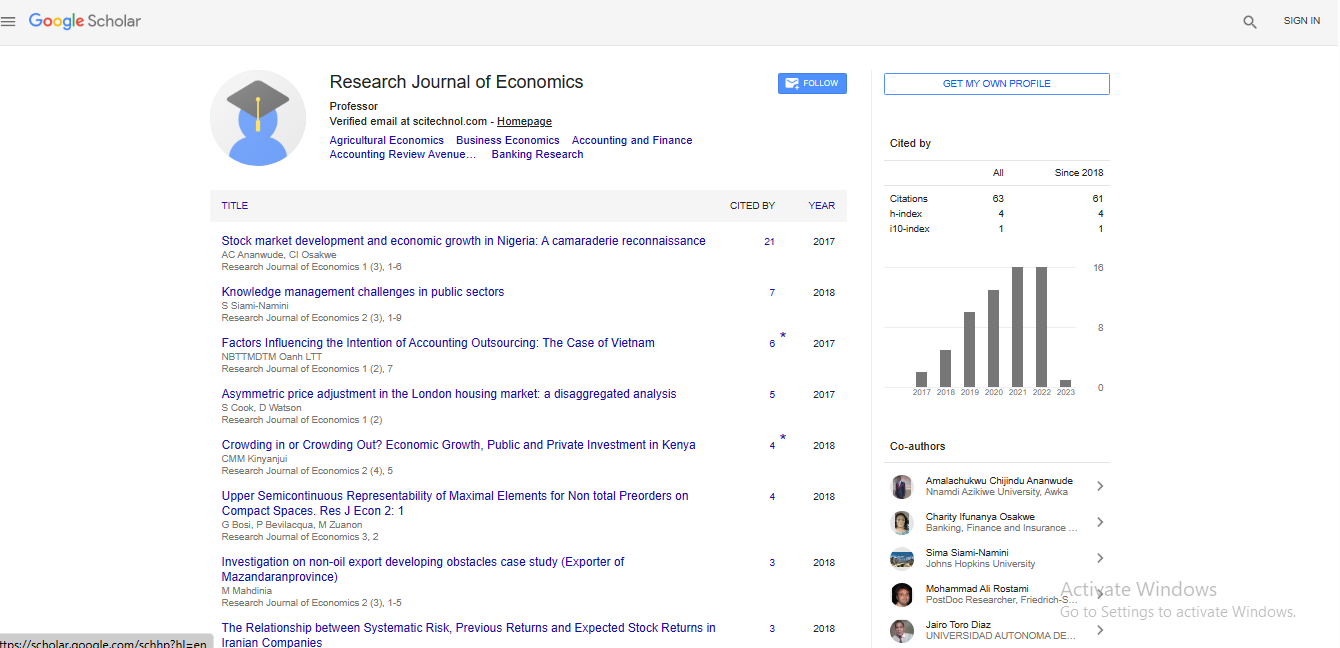Commentary, Res J Econ Vol: 7 Issue: 3
Financial Crisis: Prior Lessons and Potential Perspectives
Jordan Chad*
Department of Economics and Management, School of Business, State University of New York New Paltz, USA
*Corresponding Author: Jordan Chad
Department of Economics and Management
School of Business, State University of New York New Paltz, USA
Email: chadjor@34.edu
Received date: 28 April, 2023, Manuscript No. RJE-23-102239;
Editor assigned date: 02 May, 2023, PreQC No. RJE-23-102239 (PQ);
Reviewed date: 16 May, 2023, QC No. RJE-23-102239;
Revised date: 23 May, 2023, Manuscript No. RJE-23-102239 (R);
Published date: 30 May, 2023 DOI: 10.4172/RJE.1000145
Citation: Chad J (2023) Financial Crisis Prior Lessons and Their Potential Perspectives. Res J Econ 7:3.
Description
Economies have had financial crises throughout history, which have had a lasting effect on communities and changed the nature of international finance. A rapid and severe breakdown of the financial system, which causes widespread economic misery, characterizes these crises. These disasters, which range from the 1930s great depression to the more recent global financial crisis of 2008, have provided with invaluable insights about the weaknesses of the financial institutions. In this, everyone will examine the causes and effects of financial crises, as well as the steps taken to lessen their effects and potential preventative measures.
Causes of financial crises
Excessive risk-taking and speculation: Market players' excessive risk-taking behavior is a common cause of financial crises. Investors and financial institutions frequently engage in speculative actions that heighten market volatility and create unsustainable asset bubbles in an effort to increase profits.
Weak regulation and oversight: Financial institutions may face increased risks as a result of weak regulation and oversight. Lack of transparency and lax enforcement encourage wrongdoing, which fosters an environment conducive to the development of financial crises.
Financial system imbalances: When there are large imbalances within the financial system, financial crises may occur. Excessive debt levels, unsupportable current account deficits, or asset price bubbles are some of these imbalances. These imbalances eventually become unmanageable, resulting in a collapse that has an impact on the entire economy.
Consequences of financial crises
Economic downturn: Serious economic downturns, typified by decreased Gross Domestic Product [GDP], rising unemployment rates, and declining company investment, are frequently brought on by financial crises. These downturns have the potential to have farreaching effects, such as the decline in investor and consumer confidence, decreased expenditure, and a reduction in credit availability.
Instability in the banking and financial sectors: Banks and other financial institutions are heavily impacted by financial crises. Institutions may have liquidity challenges, solvency issues, and, in the worst-case scenario, insolvency as asset values decline and defaults increase. The failure of financial institutions can interrupt the flow of credit, further escalating the economic downturn while also undermining confidence in the system.
Financial crises have the potential to lead to social and political upheaval since people face the brunt of the effects of the economy. Public discontent can be stoked by rising unemployment, poverty, and inequality, which can result in demonstrations, political turmoil, and even social unrest.
Lessons learned and mitigating strategies
Enhanced financial regulation: One of the most important lessons learned from previous financial crises is the necessity of strong and pro-active financial regulation. To ensure transparency, risk management, and accountability, authorities should impose stronger monitoring and prudential restrictions on financial institutions. These steps can aid in reducing risk-taking and promoting financial system stability.
Improved risk management: Financial institutions must improve their risk management procedures, with a focus on precise risk assessment, stress testing, and contingency planning. Institutions can better withstand future shocks and lessen the negative impact on the overall economy by detecting and reducing risks early on also.
Improved global cooperation: Financial crises do not respect country boundaries. Therefore, tackling systemic risks and fostering financial stability depend heavily on international cooperation. Collaboration between central banks, regulatory agencies, and international organizations can speed up information sharing, policy coordination, and the creation of universal financial standards.
Promoting financial literacy: People and businesses can be made less vulnerable to financial disasters by learning about financial literacy. The danger of falling victim to unfair lending tactics or unmanageable debt loads can be decreased if people have a better grasp of financial products and the hazards connected with them.
Conclusion
Financial crises have historically been expensive and disruptive occurrences. By examining the causes and effects of earlier crises, anyone can learn a lot about how to avoid them and decrease their repercussions in the future. Building a more resilient and stable financial system will require strengthening regulations, enhancing risk management procedures, enhancing international cooperation, and improving financial literacy. One can only expect to handle the complexities of the global economy and guard against upcoming financial crises by learning from the mistakes of the past.
 Spanish
Spanish  Chinese
Chinese  Russian
Russian  German
German  French
French  Japanese
Japanese  Portuguese
Portuguese  Hindi
Hindi 